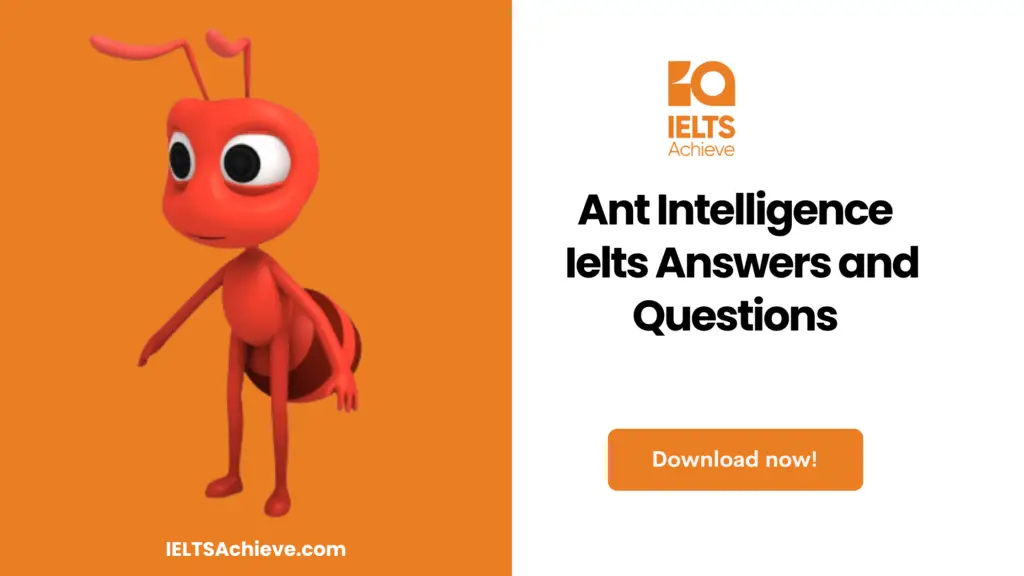The Blog post contains the following IELTS Reading Questions:
- IELTS Reading True/False/Not given
- IELTS Reading Matching information
Stay informed and prepared for success – Explore our comprehensive Reading Test Info page to get valuable insights, exam format details, and expert tips for mastering the IELTS Reading section.
Ant Intelligence – IELTS Answers and Questions

Ant Intelligence
A. Monkeys and apes come to our mind when we think about which are the intelligent members of the animal kingdom. In fact, in the insect kingdom, the social lives of some members seemed to express intelligence. Among these, the ant’s world has been investigated lately, and it is found to be that ants demonstrate sparks of cognition.
B. Ants do activities like storing food, repelling the attackers and contacting one another incase of attack by using chemical signals. This sort of chemical communication can be compared to human’s visual and auditory channels such as advertising images, political slogans, martial music and religious chants which kindle and circulate moods and attitudes among people. The biologist Lewis Thomas believes ants are resembling human beings with the following activities: farming fungi, raising aphids in livestock, launching armies to war, using chemical sprays to alarm and confusing enemies, capturing slaves, engaging in child labour, exchanging information incessantly. They do everything except watching television.
C. Humans do cultural transmission, whereas ants are the opposite. Everything should be encoded in the genes of the ant. Most of the knowledge and skills, child learns from the community as the child grows up apart from the basic instincts which he or she gained from the genes. Cultural continuity seems to give a bigger advantage to humans over ants. Ants are not either mastered fire or progressing. When comparing the agricultural skills of humans five thousand years ago, ant’s fungus farming and aphid herding crafts are sophisticated. But, it has been taken over by modern human agribusiness.
S. The ants’ farming methods are sustainable. Either, they do not spoil the environment or use immense amounts of energy. Additionally, recent evidence claims that ants’ crop farming might be more sophisticated and adaptable than was thought possible. Cellulose in leaves can’t be digested by ants but some fungi can. Therefore, the ants cultivate those fungi in their nests, bringing them to leaves to feed and then use them as a food source. To control the fungi that might act as ‘weeds’ and spread waste to fertilize the crop, ants secrete antibiotics.
E. Previously, it was believed that the ants cultivate only a single type of fungus to propagate. In genetic screening, Ulrich Muellwe of Maryland and his colleagues found 862 different types of fungi from the ant’s nests. These turned out to be highly diverse: ants probably domesticate new species in a continuous fashion. Analysing the DNA of the fungi ants enhance or alter the fungi by regularly swapping and sharing strains with neighbouring ant colonies. Evidence suggests that ants have lived in urban settings about 100 million years, developed and maintained underground cities of specialised chambers and tunnels, while prehistoric man was not even exposed to urban lifestyles.
F. We are amazed to see what humans have achieved in Mexico City, Tokyo, Los Angeles, during our survey. Still, Hoelldobler and Wilson have written a work for ant lovers, The Ants, which describes the ant Formica yessensis’s supercolony on the Ishikari Coast of Hokkaido. It was reported that this ‘megalopolis’ is composed of 360 million workers and a million queens inhabiting 4,500 interconnected nests across 2.7 square territory.
G. This kind of long lasting and intricately meshed levels of technical achievement is great when compared to our distant ancestors’ achievements. Cave paintings in southern France are only aged about some 20,000 years ago. But, ant societies existed in the same form about more than seventy million years ago. Aside from this, prehistoric man seems technologically primitive.
H. Oxford, Sussex and Zurich Universities conducted research which shows that ants came back from a foraging trip, they combine bearings and distances to navigate, which they consistently update their heads. They integrate the evidence of visual landmarks with a mental library of local directions. This is all being within a framework which is consulted and updated. Thus we can say, ants can learn too.
I. In their twelve-year research project, Ryabko and Reznikova discovered evidence that ants may communicate quite complex signals. After finding the food, the scouts returned to their foraging team. Scout was removed in order to participate in contact sessions and observe what her teammates would do. Foragers usually went to the exact spot in the maze where the food had been. Precautions were taken by employing odour clues. Now the discussion is over on how to communicate the maze’s route, whether by a “left-right sequence of turns” or a “compass bearing and distance” message.
J. Reznikova becomes so attached to her laboratory ants that she feels as if they are distinct individuals in the course of her exhaustive study. In his essays, Edward Wilson writes, ‘In the company of ants’ and advises the readers who asked what to do if they find ants in the kitchen: ‘Watch where you step. Be careful of little lives.’ And, of course, it’s not surprising.
If you want more practice, check out the IELTS reading practice tests and achieve your desired Reading band score.
Ant Intelligence IELTS Reading Questions
Questions 1 – 7
This reading passage has ten paragraphs, A–J.
Which paragraph contains the following information?
Write the correct letter, A – J, as your answer to each question.
- Ants cultivate fungi in the nests to use them as a source of food as they aren’t able to digest the cellulose in leaves.
- Edward Wilson advises those people who find the ants in the kitchen.
- Hoelldobler and Wilson have written a work for ant lovers, namely, the Ant.
- The Biologist Lewis Thomas compares humans to ants.
- Cultural continuity becomes a greater advantage for humans.
- Ant societies are existed in the present form for more than seventy million years ago
- Ulrich Muellwe of Maryland and his colleagues did genetic screening and found 862 different types of fungi from the ant’s nests.
Questions 8 – 13
Do the following statements agree with the information given in the Reading Passage? Write
- TRUE if the statement agrees with the claims of the writer
- FALSE if the statement contradicts the claims of the writer
- NOT GIVEN if it is impossible to say what the writer thinks about this
Enhance your skills in identifying information as True, False, or Not Given. Click here to discover expert strategies and techniques for mastering this question type in the IELTS Reading section.
8. Ants don’t have the ability to learn.
9. Ants do farming without ruining the environment and investing enormous amounts of energy.
10. The Brain similarity between ants and humans is about 49%.
11. Evidence suggests that ants lived in urban cities about 50 million years ago.
12. Ants cultivate only 8 types of fungus in their nests.
13. In the course of her exhaustive study, Reznikova becomes so attached to ants that she feels as if they are individuals.
Unlock your full potential in the IELTS Reading section – Visit our IELTS Reading Practice Question Answer page now!
Recommended Questions:
Renewable Energy IELTS Reading Question with Answer
Ant Intelligence IELTS Reading Answers
1. Answer: Paragraph D
2. Answer: Paragraph J
3. Answer: Paragraph F
4. Answer: Paragraph B
5. Answer: Paragraph C
6. Answer: Paragraph G
7. Answer: Paragraph E
8. Answer: False
9. Answer: True
10. Answer: Not Given
11. Answer: False
12. Answer: False
13. Answer: True

We hope you found this post useful in helping you to study for the IELTS Test. If you have any questions please let us know in the comments below or on the Facebook page.
The best way to keep up to date with posts like this is to like us on Facebook, then follow us on Instagram and Pinterest. If you need help preparing for the IELTS Test, join the IELTS Achieve Academy and see how we can assist you to achieve your desired band score. We offer an essay correction service, mock exams and online courses.

